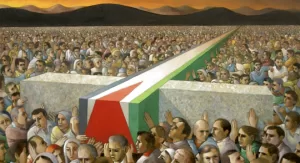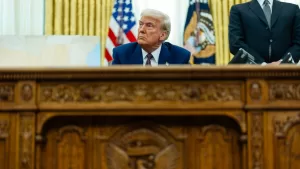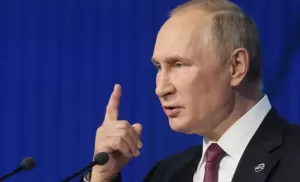❈ ❈ ❈
Mali’s Resistance Continues and Inspires
Mikhail Gamandiy-Egorov
The lifting of economic sanctions by ECOWAS against Mali should certainly not be seen as the victory of a consensus or as a sign of goodwill from the regional organization towards Bamako. The reality is that the resistance of the country’s authorities and people has proven to be effective, and is extending its influence well beyond the country’s borders.
The leaders of the Economic Community of West African States (ECOWAS) and the West African Economic and Monetary Union (WAEMU), meeting at their 61st ordinary summit in Accra, Ghana, decided to lift the economic and financial sanctions adopted against Mali since January of this year.
According to Maliweb, the leaders of the regional organization were until recently divided on the issue of lifting the sanctions. Unsurprisingly, the main proponents of maintaining the sanctions against Bamako were only the presidents of Niger and Côte d’Ivoire – Mohamed Bazoum and Alassane Ouattara. This is not surprising, as they are today among the main representatives and defenders of Franco-African interests, going largely in the opposite direction of the aspirations of their own populations, and more generally of the peoples of Africa.
For its part, Senegal, whose President Macky Sall is currently also head of the African Union (AU), seems to have been one of the main interested parties in putting an end to the said sanctions, including because of the impact that this had on Senegalese economic and commercial interests, but also at a time when Dakar is progressively moving towards multipolarity, not hesitating to go as far as criticizing the question of lifting the sanctions, as was the case during the recent visit of the Head of State of Senegal to Sochi.
Obviously, during the period of the CEDAW sanctions, which according to many sources were initially largely influenced by Paris and certain other Western capitals, Mali was able to count on the support and solidarity of several African countries, without forgetting Russia and China – which did not hesitate to use their right of veto in the UN Security Council to block the French text which sought to provide international support for the sanctions.
But certainly the great merit of this success for Bamako goes once again to the very large national popular mobilization, which not only did not hesitate to give firm support to the country’s authorities, but also demonstrated a capacity to resist external pressures in a dignified and patriotic manner.
Also, it should certainly not be forgotten that Mali after years of chaos has become – under the leadership of Colonel Assimi Goïta and his team – a great source of inspiration for many other African nations and an example of effective resistance to Western neocolonialism nostalgic for unipolarity.
In general, the current events demonstrate perfectly that sanctions – one of the favorite instruments of the Western establishment and its supporters – not only do not bring the desired result for its instigators, but on the contrary, they push worthy nations to increase their efforts to counteract the difficulties that the said instigators sought to create for the sanctioned countries.
As for other African leaders, many of whom cannot boast of a popularity comparable to Assimi Goïta on the national and continental scenes, many nevertheless understand that in the face of current events, it is more than ever time to bring themselves up to date with the new global realities.
As for those who have made the firm choice to stay with the Western establishment to the end, beyond continuing their own marginalization and isolation in an Africa that is increasingly openly choosing the path of pan-Africanism and a free choice of external partners – their future is not promising. And taking refuge in the pro-Western bubble in the hope that it will save them from being swept away by popular mass mobilizations seems to be a strategic mistake by people who, like their sponsors, do not understand the multipolar international order. And what it will become.
(Courtesy: Internationalist 360°.)
❈ ❈ ❈
Sudan: The West’s Hypocrisy
Hussam Abdel Kareem
The Sudanese revolution continues its valiant victories, for which it has paid in advance with pure blood and precious souls since its inception, to reassure the world that this nation is impervious to submission and defeat, and that this revolution will achieve its noble goals regardless of who approves or disapproves.
– Sudan Resistance Committees
A new wave of demonstrations took place in Sudan on 30 June 2022. Tens of thousands of Sudanese took to the streets in Khartoum calling for democracy and a civilian state and chanting against the army chief, General Abdel-Fattah El-Burhan, who rules the country since the collapse of the old dictator, Omar El-Bashir in 2019. The civilian demonstrations were met with brutal force and live firepower by the police. Ten people were reported dead as a result.
Well, the demonstrations were no surprise. The new generation of Sudan’s young revolutionaries has shown remarkable determination in their struggle against oppression and dictatorship. That was evident in the 111 days of persistent acts of public protests, strikes, and demonstrations between December 2018 and April 2019 led by a very brave revolutionary generation, both men and women, who finally succeeded in defeating the old dictator Omar El-Bashir.
Since then, the revolutionary spirit never died and waves after waves of protests and demonstrations continued to take place despite the brutality of military leaders that left hundreds, if not thousands, of protesters dead. El-Burhan’s maneuvers and tricks failed, and the young people continued to see the current regime as another face of the old dictatorship.
From day one, El-Burhan and the group of Generals surrounding him, felt they need external support. The military leaders who took over in Sudan after El-Bashir’s collapse knew very well that they could not survive without obtaining vital foreign support to keep them in power. So, one of the first steps taken by El-Burhan was to meet with the then Israeli Prime Minister Benjamin Netanyahu in preparation for “normal relations” between Sudan and “Israel”. Obviously, El-Burhan knew very well how close Netanyahu was to America’s Trump and how dear he was to his heart. And it worked! Netanyahu was key to El-Burhan’s access to President Trump who endorsed the new regime in Sudan especially after the new rulers “renounced terrorism” and declared Sudan’s acceptance of moral and legal responsibility for the attacks on US embassies in Eastern Africa in 1998 which were carried out by Bin Laden’s Al Qaeda organization. El-Burhan was then quick to join the “normalization with Israel” business and jumped into that circus, known as “Abraham Accords”, and established diplomatic relations with “Israel”.
To Donald Trump and the Zionist lobby in the US, that was good enough, and the American President decided to remove Sudan from the US black list of “states sponsoring terror”, thus opening the door for restoring Sudan’s eligibility for getting loans and financial aid from the World Bank. Having secured political cover from the US (and financial support from Saudi Arabia and UAE), Sudan’s Generals felt they are in a strong position to sit comfortably in power and tighten their grip on the country without really caring for the civilian component in their rule.
Now what? We see a group of corrupt generals ruling Sudan and bluntly suppressing the people’s aspirations. We see ordinary people, young and old, men and women, all taking to the streets asking for their legitimate rights of freedom and civilian rule. We see unionists, students, and political activists facing the guns and bullets of the army chiefs. Isn’t that enough for the West, particularly the US, to act?! The West, busy with the Ukraine conflict under the banner of “people’s rights”, is not doing anything to press the El-Burhan regime in Sudan. The West is, unfortunately, careless about the people of Sudan. Compare that to the case of Cuba, for example. For over six decades, the US is imposing very harsh economic sanctions and extreme pressure on the small nation because the USA claims it’s a “dictatorship” ?! America’s proclaimed sympathy with the Cuban people while hugging Sudan’s generals, is crystal clear hypocrisy.
Oh, but America did something! The “Bureau of African Affairs”, a part of the State Department, issued a Tweet saying “We condemn in the strongest terms the use of live fire by security forces against civilians”. Apart from that isolated Tweet, the US did nothing. No sanctions, no economic measures, no political pressure, no calls to bring the killers to justice. Nothing practical, nothing meaningful. The American Tweet is actually lip service, no more.
America’s dealing with Sudan’s situation is yet another example of Western hypocrisy. This kind of hypocrisy is also evident in Latin America and it’s indeed what’s pushing more nations in that continent to lean to the left and distance themselves from the US and its policies. Once the ruling regime jumps into the American camp, it gets “clearance” and becomes practically protected, and that’s what the military leaders in Sudan realized at an early stage. El-Burhan and his Generals submitted their “credentials” by appeasing Donald Trump and establishing friendly relations with “Israel”, and now reaping rewards.
But the Generals of Sudan have to be cautious. Relying on Western and Israeli backing won’t help them in the long run. The spirit of the Sudanese people is still very much alive.




